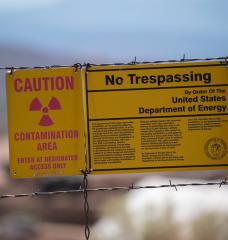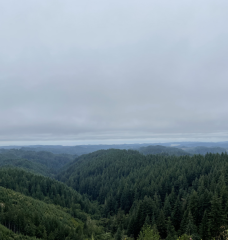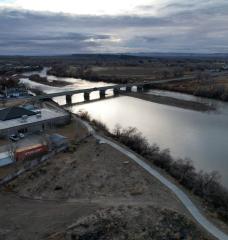
This story by ESI Journalism Fellow Micah Drew was originally published as part of Montana’s Climate Change Lawsuit reporting by The Flathead Beacon, where it appears with additional photos and resources.
__________
The recent legislative session passed a slew of laws that highlight lawmakers’ energy priorities, and took direct aim at the pivotal case, Held v. Montana
Montana has a long history of supplying this country — and others — with heaps of raw material to generate and transmit electricity. Those natural resources include the Powder River Basin’s coal seams, the Bakken Formation’s oil and gas reservoirs, and Butte’s vast copper deposits. On the one hand, the Treasure State’s extraction of heavy metals and hydrocarbons has resulted in a grim environmental legacy, which includes the Berkeley Pit, a textbook remediation failure so toxic that in 2016 it killed thousands of migrating snow geese in a matter of days. On the other hand, that legacy has also helped engender some of the strongest constitutional protections for the environment in the country.
In 1972, 100 delegates rewrote Montana’s constitution to include the preservation of a “clean and healthful environment” for “present and future generations.” The delegates, everyday people, not politicians, also directed the state’s citizen legislature to adopt laws to protect the state’s “environmental life support system” and guard against the “unreasonable depletion and degradation” of its natural resources.
When 150 lawmakers converged on the Capitol this January for the Legislature’s biennial session, the uneasy interplay between all of that subsurface wealth and Montana’s constitutional directives came into focus as the Republican-controlled Legislature passed industry-friendly measures intended to keep coal — and other fossil fuels — king in the Treasure State.
Additionally, two measures passed by the Legislature’s first dual-house supermajority in a century have profound implications for Held v. Montana, the first youth climate lawsuit in the country to go to trial. On June 12, 16 Montana youth and a collection of expert witnesses will argue that the state’s approach to energy permitting has deprived the youth of their right to “a clean and healthful environment” and other Constitutionally-enshrined rights. They’ll also argue that, by being so permissive with the extraction and combustion of fossil fuels, Montana agencies have violated the public trust doctrine, which holds that governments must manage shared natural resources for the benefit of present and future generations.
One of the 2023 bills referenced in recent Held filings explicitly bars state agencies from including the analysis of greenhouse gas emissions or climate-related impacts in environmental reviews. Its passage made national news in May. The other bill repeals the entirety of the Montana Energy Policy, a fossil-fuel-heavy energy vision for Montana that forms a central component of the plaintiffs’ claims.
During the 90-day session, the Legislature also passed bills that loosen coal-mining regulations, prohibit local governments from adopting regulations to steer their communities toward cleaner energy sources, and make it harder and more expensive for environmental groups to delay or stop projects with litigation.
HOW THE MONTANA ENVIRONMENTAL POLICY ACT AND THE MONTANA ENERGY POLICY FACTOR INTO LITIGATION
Relatively early in the 2023 session, lawmakers made a party-line vote to repeal the Montana Energy Policy, a 30-year-old piece of (heavily amended) law plaintiffs referenced in filings for its pro-fossil fuel language.
The Montana Energy Policy is a somewhat clunky, even contradictory, piece of code. It established a broad vision for energy in the state and includes more than 30 sub-clauses. Parts of it call for the state to increase oil and gas exploration and development in order to create high-paying jobs and reduce reliance on foreign oil — amendments added to the policy in 2011; other parts direct policymakers to use new and innovative technologies such as batteries and green hydrogen to complement wind and other renewable energy sources. The policy also calls for distributed generation and a focus on energy conservation and efficiency, which renewable energy wonks have championed for years.
For his part, House Bill 170 sponsor, Rep. Steve Gunderson, R-Libby, argued that the policy amounts to an “advisory-only” piece of code that “has no teeth.” The real nuts-and-bolts of energy policy, he said, involves more specific regulations implicating tax codes, permitting processes and land use. He also said Gov. Greg Gianforte should have an opportunity to start fresh with his own energy priorities.
The energy policy is “nothing but a political football,” according to Montana Petroleum Association Executive Director and former state lawmaker Alan Olson. “I guess I’d refer to it as a letter to Santa Claus. [Its repeal] will not have any effect on energy policy moving forward.”
Although lawmakers made few, if any, references to the climate trial when debating HB 170, it appeared in lawsuit filings shortly after Gianforte signed it into law. Montana Attorney General Austin Knudsen, a Republican who’s been vocal in his support of the Keystone XL pipeline and free with his criticism of President Joe Biden’s oil and gas leasing approach, moved to dismiss parts of the suit centering the energy policy. He argued that the removal of that piece of law had invalidated plaintiffs’ claims.
Despite arguments made by the plaintiffs’ attorneys that the statutory appeal of the state’s energy policy did not change Montana’s de facto energy-permitting approach, Lewis and Clark County District Court Judge Kathy Seeley,agreed to dismiss the claims based on the energy policy. The order she issued May 23 affirmed the lawsuit will proceed, with a narrowed scope based on the remaining claims regarding the environmental review process.
Gunderson, a former mining contractor who chairs the House Natural Resources Committee, also garnered attention when he submitted a request for a bill titled “Revise Montana constitutional language regarding clean and healthful environment” — the protections that are a foundational piece of the youth plaintiffs’ claims.
In late December, Gunderson put the draft request on hold and left it there, but not before it made national waves. Gunderson’s proposal was never officially introduced or debated— GOP leadership said the party would rally behind about a dozen constitutional amendments they had identified as having the best chance of passing.
A prominent GOP-backed measure that did make it across the finish line involves the Montana Environmental Policy Act, or MEPA, which directs the state to take a comprehensive look at the environmental impacts of large projects and highlight potentially impacted historical and cultural sites. In the last several years, groups such as the Sierra Club, Montana Environmental Information Center and the Park County Environmental Council have made MEPA claims to challenge a Paradise Valley gold mine, NorthWestern Energy’s Yellowstone County gas plant, and an expansion of the Rosebud coal mine, the sole supplier of the Colstrip coal-fired power plant.
Senate Bill 557 sponsored by Sen. Mark Noland, R-Bigfork, puts stricter parameters around nonprofit groups’ ability to sue under MEPA by requiring groups challenging state permitting actions to post a bond before filing a lawsuit and to seek a preliminary injunction, a tough-to-reach legal standard that would immediately halt a project.
SB 557 underscores that MEPA is supposed to provide a procedural rather than regulatory framework for permitting decisions, Noland told his colleagues. It’s intended to prevent “good people, good companies” from losing revenue due to “frivolous lawsuits,” he said, adding that it will ensure that individuals or groups challenging a state-issued permit establish “legitimacy” first.
Opponents of that measure, including a grassroots group that used MEPA to oppose a Paradise Valley gold mine, questioned whose interests the bill furthers and argued that it would prevent local organizations from effectively representing the concerns of individuals and businesses living with a large project’s impacts.
“Most Montanans are not billionaires — if this bill had been in place, our community could not have afforded to go to court,” Michelle Uberuaga with Park County Environmental Council told the House Natural Resources Committee.
SB 557 was signed into law May 19. Both the sponsor and some of its opponents said legal challenges to it are likely.
Continue reading on the Montana’s Climate Change Lawsuit website.






